| |
The Jowsey Java Zone: Recommended Reading |
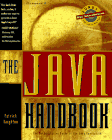 |
The Java Handbook by Patrick Naughton A favorite resource, written by one of the original Java wizards. Designed for all programming levels, this book covers the fundamental topics thoroughly, and provides useful executable code examples throughout. Includes chapters on advanced Java features such as multi-threading, networking, and GUI programming. A must-have book for every hard-core Java hacker! |
 |
Java in a Nutshell : A Desktop Quick Reference by David Flanagan, Mike Loukides (Editor) The second edition of the best-selling "Java in a Nutshell" has been updated to cover version 1.1 of the Java Development Kit (JDK). This complete quick-reference guide to Java contains descriptions of all the classes in the Java Core API, with a definitive listing of all methods and variables. |
 |
Java Examples in a Nutshell : A Tutorial Companion to Java in a Nutshell by David Flanagan From the author of "Java in a Nutshell" comes "Java Examples in a Nutshell" -- chock-full of practical, real-world Java programming examples that readers can learn or modify for their own use. The first book I reach for when I need to study some real-world working code! |
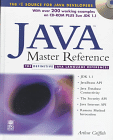 |
Java Master Reference by Arthur Griffith Why get another book on Java when your shelf is cluttered with dozens of them? Because Java Master Reference isn't your run-of-the-mill Java title. Packed with over 1600 pages of detailed information and code, Java Master Reference is the ultimate Java programmer's resource. It contains explanations for over 7,000 keywords, API calls, class libraries, and language constructs. You'll also find complete coverage of JDK 1.1, JavaBeans, inner classes, introspection, and security. Java Master Reference is organized alphabetically with cross-reference, so finding the material you need is quick and painless -- look up topics by keyword, function, concept, structure, and capability. Java Master Reference also includes a CD-ROM that contains the Sun JDK as well as every example of source code used in the book. |
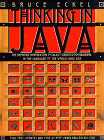 |
Thinking In Java by Bruce Eckel From the fundamentals of Java syntax to its most advanced features (network programming, advanced object-oriented capabilities, multi-threading), "Thinking in Java" is designed to teach solid Java programming techniques! Bruce Eckel's readable style and small, direct programming examples make even the most arcane concepts clear. |
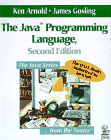 |
The Java Programming Language by Ken Arnold, James Gosling The Java Programming Language is the definitive technical guide to the Java language, offering a solid foundation in Java programming strategies and techniques. Ken Arnold and James Gosling explain Java's design motivations and tradeoffs, while presenting a wealth of practical examples. Written for programmers who've had experience with object-oriented programming, this book explains the design motivation of JDK 1.1 and 1.2, and the tradeoffs involved in using specific features. After a concise introduction to the programming language, chapters describe its commands, constructs, and libraries and offer real-world examples showing how to exploit its portability and flexibility. |
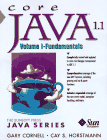 |
Core Java 1.1 : Fundamentals by Cay S. Horstmann, Gary Cornell Straight from the source at Sun Microsystems comes Core Java 1.1, Cay Horstmann and Gary Cornell's "official" guide to Java. The first volume deals with the fundamentals of Java programming. Geared toward the more experienced programmer who has a knowledge of some other programming language, this guide is full of tips and smart enhancements to help you get the most out of basic Java. |
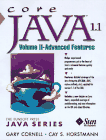 |
Core Java 1.1 : Advanced Features by Cay S. Horstmann, Gary Cornell The second volume of Core Java 1.1, Sun Microsystems' "official" guide to Java programming, provides coverage of advanced Java topics that you won't find discussed anywhere else, including excellent material on Java network programming. The excellent excerpts of working code will also help you solve a wide variety of real-world problems that turn up in everyday development. |
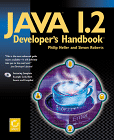 |
Java 1.2 Developer's Handbook by Philip Heller, Simon Roberts Reviewed by the Java Developer's Journal as "the most advanced guide to Java available", this handbook includes material on the JDK 1.2 API's just released by Javasoft. The book features topics like networking, security, Java IDL, IIOP, RMI, and 2D for interactive Web content. The CD-ROM is packed with the best cutting-edge tools and utilities for Java. If you're building full-scale Java applications, you need this book in your reference library! |
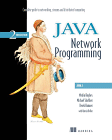 |
Java Network Programming by Merlin Hughes, Michael Shoffner, Derek Hamner This is the best and most up-to-date book to focus specifically on the Java 2 Platform's networking abilities, in all their various forms. Providing a thorough grounding in, and complete reference to, the Java technologies that are fundamental to network programming, with a specific focus on streams, the book then proceeds to detail how to implement robust, real-world Java-based network applications. |
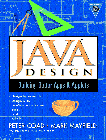 |
Java Design : Building Better Apps & Applets by Peter Coad, Mark Mayfield, Jill Nicola "This is a revolutionary book in the Java programming book market since it doesn't teach you how to program ... This is a book for those who need to implement large and complex applications and want to learn how to use all the powerful mechanisms offered by the language in order to create better and well-organized applications." -- Book Review, Java Universe Developer. Get down to business with Coad and Mayfield as they systematically unfold essential strategies for designing better Java apps. |
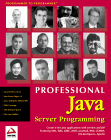 |
Professional Java Server Programming with Servlets, JavaServer Pages (JSP), XML, Enterprise JavaBeans (EJB), JNDI, CORBA, Jini and Javaspaces by Andrew Patzer, Sing Li, Paul Houle, Mark Wilcox, Ron Phillips, Danny Ayers, Hans Bergsten, Jason Diamond, Mike Bogovich, Matthew Ferris, Marc Fleury, Ari Halberstadt, Piroz Mohseni, Krishna Vedati, Stefan Zeiger Starting with a grounding in Web application development and technologies, this book introduces the various concepts of using Java to deliver Web content -- as well as helping to give you the tools you need to work around the limitations of Web servers and Web browsers. You'll also learn how to develop complex database-driven applications -- and how to work faster. Since this is a book on the cutting edge of Java development, you'll also find sections on using Java with XML documents and LAP directory servers, as well as Enterprise Java Beans. There's even a good examination of the next generation of Java technologies -- Jini and JavaSpaces -- with a look at how these can be used in Web applications. |
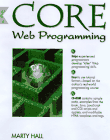 |
Core Web Programming by Marty Hall, Gary Cornell "One-stop shopping" for Web programmers! Every Internet and intranet developer needs to understand four core technologies: HTML, Java, CGI and JavaScript. Now, you can learn them all in one book: Core Web Programming, the ultimate Web development resource for experienced programmers! Ten chapters teach experienced programmers all they need to write great Java programs. Start with the basics of Java syntax and object-oriented programming, then take an in-depth look at the AWT -- including the new event model and every 1.0 and 1.1 component. You'll even learn advanced multi-threading and client/server techniques! |
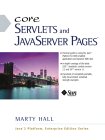 |
Core Servlets and JavaServer Pages by Marty Hall Marty sez: "Real Code for Real Programmers! This book is aimed at serious software developers. This is ... a hands-on book aimed at helping programmers who are already convinced of the need for dynamic Web sites get started building them right away. In showing how to build these sites, I try to illustrate the most important approaches and warn you of the most common pitfalls. Along the way, I include plenty of working code: more than a hundred documented Java classes, for instance. I try to give detailed examples of the most important and frequently used features, summarize the lesser-used ones, and refer you to the APIs (available on-line) for a few of the rarely used ones. " |
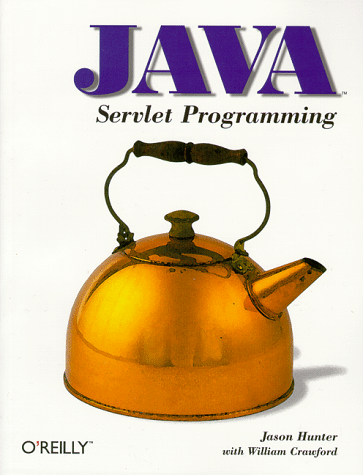 |
Java Servlet Programming by Jason Hunter, William Crawford, Paula Ferguson (Editor) This book is a superb introduction to Java servlets and their various communications mechanisms. It includes deep and comprehensive coverage of the Java Servlet API, and also of HTTP, non-HTTP socket communications, Remote Method Invocation (RMI), and more. Throughout, the authors present excellent illustrative code, and go to much effort to explain why things work the way they do. Topics include serving dynamic Web content, maintaining state information, session tracking, database connectivity using JDBC, and applet-servlet communication. |
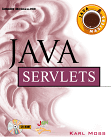 |
Java Servlets by Karl Moss Write leading-edge Web Server Applications with Java! With this guide you leave CGI behind and use Java to develop the versatile, distributed, Internet-based applications that Web users and businesses are demanding. This book focuses on the development of Internet-based applications using the Java Servlet API. The CD-ROM includes the JRun servlet runner from Live Software, ServletExec servlet runner from New Atlanta, JBuilder IDE from Inprise, and the source code for all the applications in the book. |
 |
The New Hacker's Dictionary by Eric S. Raymond (Compiler) OK, so it's not exactly about Java, but who cares? This little gem is an absolute must-have on every coder's bookshelf! Read it and laugh!!! |
